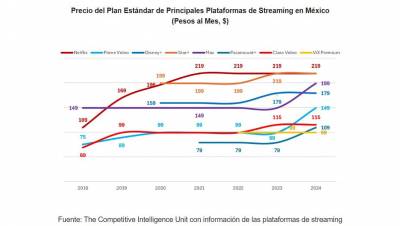The late entry of Venezuela into the world of subscription television has allowed this country to have an advantage over others in Latin America: today the wiring that crosses the nation has state-of-the-art technology, competitive until 2020 and ready to provide digital television services, interactivity, added value and telephony. The limits are set only by state policies on telecommunications.
There are fourteen companies operating the subscription system in Venezuela, and about ten or twelve are in the process of legalization before the National Telecommunications Commission, Conatel. The pioneers of cable television were Omnivision and Cablevision, about five years ago. They work with the MMDS system, via microwave.
Of the fourteen legal operators, ten work with the cable system and concentrate a good part of their energies on advancing in the coverage of the areas of greatest population concentration. SuperCable and Cabletel stand out for the progress and positioning they have achieved so far.
SuperCable has the first license, 001, and a national coverage authorization. Starting from Caracas where 40% of its key market is concentrated, the company has advanced in the difficult geography of the city to reach large areas, the sectors of the upper middle class and middle class more densely populated, allowing it to gain about 40 thousand subscribers. His expectation for this year is to reach 100 thousand. In addition to Caracas, the company managed to extend its broadcast network to six cities: San Antonio de los Altos, Puerto La Cruz/Barcelona, Puerto Ordaz, Maturín and Maracay. By 1997, SuperCable plans to enter three or four more cities, but the ultimate goal is national coverage in the main population centers. "We are working with a 750 Mhz network, based on fiber optics, which allows a large number of analog channels, eighty, and in the future with digital technology could be five hundred to a thousand," says Ahmad Khamsi, enthusiastic president of SuperCable, a man with a long career in the medium of international television. "In addition, our constructions and pipelines (we make this huge investment), are designed to be able to expand to other services when we have the permission of Conatel. "The SuperCable project is Andean, it's not just in Venezuela. The U.S. partner, Adelphia Communications, is one of the leaders in cable TV in that country, and the rest of the capital is Andean. We have a value-added license in Colombia and will soon start operations. Four years ago there is a person there developing the permitology."
SuperCable offers 52 international channels, plus the 7 national channels that arrive at home in a clear way. This year they hope to reach 70.
Cabletel, towards the lower strata
The company Cable Corp. TV, better known by its commercial name Cabletel, has directed its batteries towards sectors of lower purchasing power in the city of Caracas and takes its growth expectations calmly, according to Alberto Arapé, director of the company, currently in recess while holding the presidency of the Venezuelan Chamber of Subscription Television, CAVETESU.
Cabletel defined long ago that it was going to the west of the city according to the following criteria of strategic order:
1. The dense sectors of the west make the business attractive; 2. Until the arrival of Cabletel there was not a sufficient supply to meet the needs of that market; 3. This will allow us to ensure contact with dense commercial and financial sectors, to offer in the future, not only cable TV, but value-added services and telephony in the year 2000.
The tremendous insecurity of the sector that keeps people in their residences, the concentration of people per housing unit, and the fact that many of them are already consolidated and paid, are also incentives for the company. Cabletel has presented them with an economic offer, based on the 25 most watched channels."
Cabletel currently works with a hybrid network of coaxial cable and fiber optics at 550 Mhz. But, among its plans for the year 97 are to enter to modular in 750 Mhz and begin to provide the Internet service. Its nodes are designed for bidirectionality, ready to offer interactive services, voice and data. "We have had a conservative growth," says Alberto Arapé, "we closed 96 with 10,000 subscribers and this year we plan to close with approximately 25,000."
Cabletel's key partners are the third largest cable operator in the U.S., Comcast International, and Venezuelan entrepreneurs from the Zubillaga Group. It is also, among other minority shareholders, the Wave International group, with recognized experience in the area of telecommunications; "They have an advisory and comptroller function, because the company is managed with Venezuelan engineering."
The regulatory scenario
Cable television in Venezuela is regulated by a 1991 law and is affected by the difficult economic situations that the country is going through. Faced with an environment of controlled exchange and unfavorable parity against the dollar, today entrepreneurs are more optimistic, due to the positive results that are beginning to be observed in the economy after the implementation of the adjustment plan. Khamsi has spoken out for the expectation of a strong growth of the cable industry in Venezuela for the years 97 and 98.
In the last two years, CAVETESU has had two major struggles for existing cable operators. However, the contradictions of competition and growth in an environment with unclear rules are still observed. The first conquest has been to remove from the competition in television at least until 2000, the CANTV, a privatized company that maintains the monopoly of telephony until 99, and of which the intention to enter the business has been known. On the other hand, it has been up to him to combat the Luxury Tax that was assigned by the government to the sector and that increased the price of subscriptions by 20%. To this end, there have been sustained battles within the national congress with victorious results.
As the contradictions do not escape this process, the dispute regarding the development of the wiring in the capital has been public. The companies themselves have made large investments necessary for the extension of the network, so they have full authority over their pipeline, an issue that has been questioned by companies such as Cabletel.
The interior has its network
Other companies are also moving more secretively in the development of new networks. One of them, Comunicaciones Centurión, under the commercial name Caracas Viva TV, begins to cover halfway between the microwave and the cable the center of the city. Another company, Proseqal, directs its efforts towards the center of the country, declaring some 22,000 subscribers in the llanero states.
Intercable makes its investment in the Lara-Mérida area, to the west, with about 12,000 subscribers and plans to expand to the surrounding states. Ultravisión, under the direction of Alejandro Fuenmayor, directs its immediate plans towards Caracas and its dormitory cities. They currently have 55 contracted channels. Its license is nationwide. Other companies that also work on the multiple virgin areas of cable television are Parabólicas Caracas, Parabólicas Service and Satvenca.
It is estimated that the universe of subscribers in the country is currently around 200 thousand. The powerful presence of Direct TV has, however, substantially changed the landscape. Everyone recognizes in this company a strong competitor, however, they see in their technology limitations of unidirectionality, the viewer can not interact with the satellite. "It is a tremendous competitor," says Cabletel's Arapé, "and it will force everyone to look for their respective market niches, pushing us to make thorough use of our services and signal quality." For his part, Khamsi of SuperCable says: "Direct TV will succeed especially in low-density areas, but in areas where cable reaches it represents an expensive investment, in prices and products they cannot compete with us."
All against pirates
It was notorious ten years ago throughout the country, and especially in Caracas, the emergence of parabolics like mushrooms on buildings and fifths. With the advent of subscription television the legal situation begins to turn around and companies organize to defend the copyright of the channels they represent.
"There is a huge volume of piracy that is not currently controlled by the authorities or by Conatel and that harms the legitimate cable TV industry," says Khamsi. SuperCable, Direct TV and HBO Latin America have joined forces with the Motion Picture Association of America in a joint agreement to enforce copyright. Currently, an alliance between these companies, the Venezuelan Institute of Cinematographic Representations and the Anti-Piracy Division of the Judicial Technical Police, are working to detect the instigators of piracy and to develop awareness campaigns. It was a widespread phenomenon for condominiums and illegal supplier companies to retransmit subscribed channels on U.S. soil. Decoders were exported with permission only in the U.S. Investigations are the step prior to the taking of legal action.























